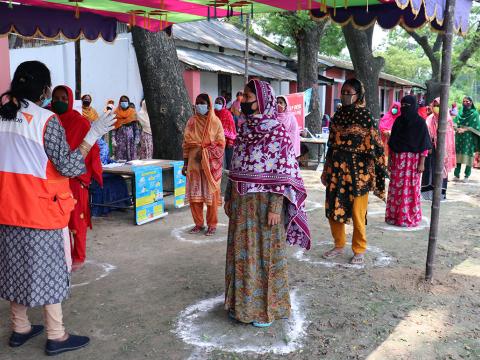COVID-19: World Vision and KOICA provide rice to the most vulnerable people in Bangladesh


“I am happy that today we will be able to eat a full plate of rice,” says 8-year old Naznin.
Livelihood is the most severely impacted sector by the spread of COVID-19 in Bangladesh. This assumption is supported by the 'Rapid Impact Assessment' conducted by World Vision Bangladesh from 52 Upazilas of 24 Districts of Bangladesh. The overall objective of the study was to understand the impact the COVID-19 pandemic on the most vulnerable children, their families and communities across Bangladesh.
Livelihood was identified as the number one priority sector where immediate support is needed. The report also reveals that 95% of the households' livelihoods activities affected, 89.6% of households' income reduced and 94.7% of households have no or inadequate food stock. Consequently, the children became more vulnerable.
To address the nutritional need of the most vulnerable children and their families, KOICA supported the Maternal Child Nutrition Project, which provided 2,833 most vulnerable households with 9.3 Kg of rice for each family at three sub-districts (Joypurhat Sadar, Panchbibi and Dhamoirhat) of Joypurhat District on July 1, 2020.
" In this COVID-19 pandemic, the livelihood of everyone especially the low to middle-income people got badly impacted. We are providing the staple food for the community who are the most vulnerable and economically affected by the crisis to ensure their basic nutritional need. We know this is not enough but this is what we have for now to help them to survive," says Anjoli J. Costa, Regional Field Director, World Vision Bangladesh.
KOICA, ‘Maternal and Child Nutrition Project’ is a Korea International Cooperation Agency funded flagship project of World Vision Bangladesh which has been implementing since 2015. The project has made a significant improvement of health and nutrition indicators in three sub-districts of Joypurhat and Naogaon districts under Rajshahi division. Phase-II of this project started in February 2018 covering the same districts in different unions which were not covered by Phase-I.
It is an integrated approach by focusing on Nutrition and Economic Development to ensure that households not only improve their knowledge and change their behaviour but also have the existing resources to support them and a special focus on 1000 days interventions, from conception to two years of age, which provides children with the best chance to avoid being stunted and cognitively impaired and ensure deeper nutrition outcomes. Nielsen Bangladesh Com ltd. conducted a baseline survey in M&CN-NK-KOICA project working areas in 2018 and found that prevalence of undernutrition (underweight-31%, wasting 18.2% and stunting 36.10%) among under-five children is more than the critical threshold point of WHO.
The goal of this project is to reduce the incidence of malnutrition in children under five years of age living in three Upazilas: Dhamoirhat, Panchbibi, Joypurhat.